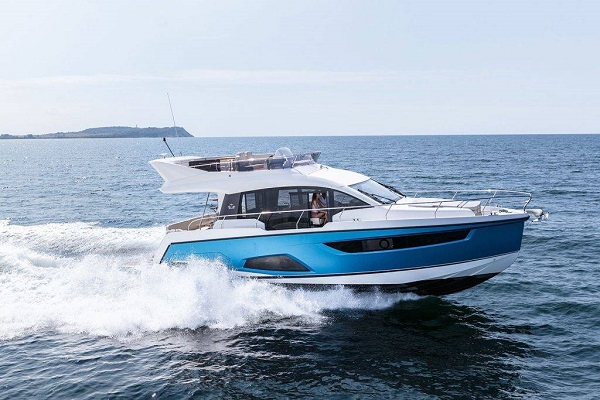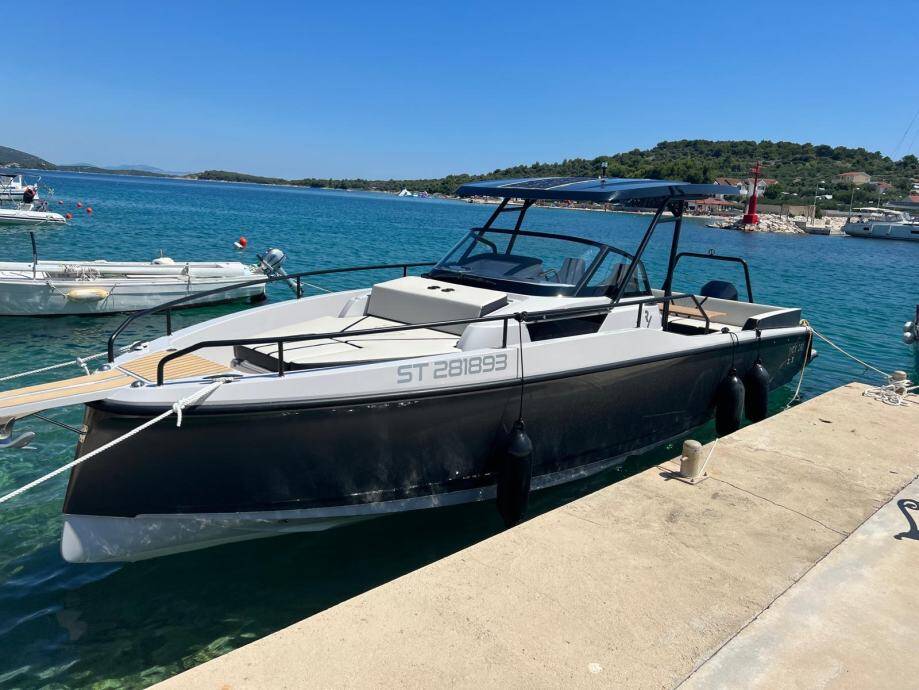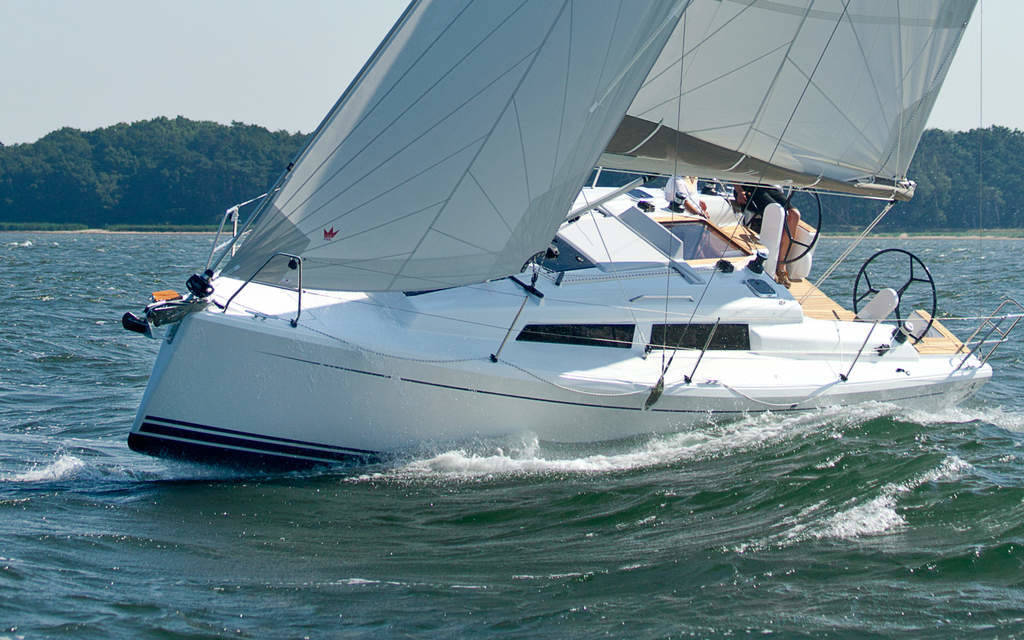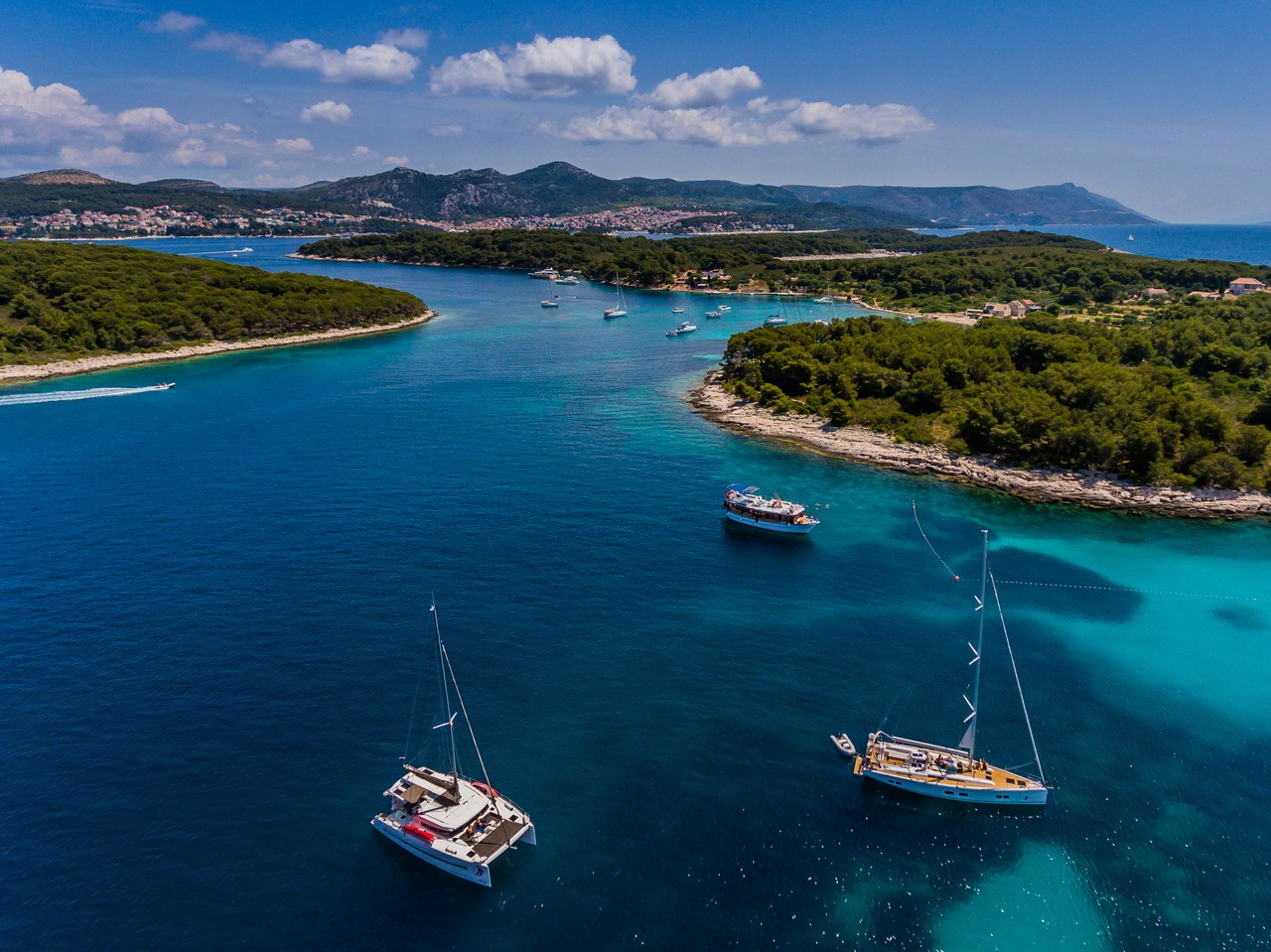Feel free to ask us anything – our team is on your side!
For any questions during the office hours please call our team in our Split headquarters on +385 21 332 332 or send us an e-mail on the address croatia-yachting.hr.

Owning a yacht is seen as the ultimate symbol of luxury, creating unforgettable memories and ability to sail the seas whenever you wish. However, with that freedom also comes a huge financial responsibility. For many, the dream of owning a yacht is quickly tempered by the reality of the associated costs.
While yacht ownership offers the advantage of having full control and access to your own vessel, it also comes with hefty expenses, from the initial purchase price to ongoing operational costs.
In contrast, Yacht charter offers a viable option to satisfy the craving for yachting without commitment of long-term vessel ownership from straightforward yacht chartering or yacht renting. It is advisable to first appreciate the economic aspect as much as possible before plunging into the murky waters of yacht acquisition which is why we listed and explained all yacht ownership costs into subsections in order to give a better insight.
The costs pertaining to the yachts can range reasonably depending on several determinants such as the size and type of yacht in question, is it a new yacht or a used one and the different operational and additive expenses in ownership of the vessel. To verify why this is the case and define the market situation, here we gathered some of the interesting statistics regarding yacht ownership and the yacht market:
Let’s explore how much it truly costs to own a yacht and whether it makes more sense to rent instead.
The initial cost of yacht can vary widely depending on the size and type of vessel you choose. Generally, yachts come in various sizes and therefore different classes and the prices generally goes up in a considerable manner as the size increases. Here, we listed the general price ranges for different yacht sizes:

These yachts are also referred to as day cruisers are made for quick use and short distance traveling. The average length of these vessels is somewhere between 10 to 15 meters which make them easy to maneuver as well as, multitask. Small yachts can be used by those who want to go for an quick sailing tripwith family and friends or want to do quick island hopping without significant crew or large maintenance and running costs.
Moreover, many include two small cabins, a small living area, and a compact kitchen counter that entirely suffices vacationing on water and all its basic essentials for the short stay. They also include all the safety gear and necessary navigation equipment, intending to travel even larger distances safer.
These smaller yachts are primarily popular with beginner yacht enthusiasts or those who seek a more personal experience. As for the cost of a new small yacht, the average amount starts with 500,000 € for basic models and it can reach up to 2.5 million €, depending on a brand and quality, materials used and the additional options included into the price. With customization options, the owner can create more luxurious interiors and include high technology in their small yacht as per their requirement.
As mentioned. the cost of smaller yachts is lower than that of those larger yachts which provides a more extensive range of prospective buyers. In fact, smaller yachts are extremely suitable for recreational sailing because of their affordable price and more accessibility. They also tend to have significantly lower operation and maintenance costs, which could be lucrative choice for people in a search for their perfect yacht.

Medium-sized yachts are more suitable for longer sailing and can accommodate more guests. Such types of yachts are usually provided with several cabins, a kitchen and several other rooms. The starting price as generally is with regards to medium yachts it is from 2 million euros and the peak price could reach as high as 6 million euros.

Large sized yachts offer even more luxurious accommodations, more decks, pools and more. A large yacht generally costs within 6 million euros up to 15 million euros surely depending on its design and features. This type of yacht is more appropriate for long travels and has advanced navigation and safety systems.
Large sized yachts offer even more luxurious accommodations, more decks, pools and more. A large yacht generally costs within 6 million euros up to 15 million euros surely depending on its design and features. This type of yacht is more appropriate for long travels and has advanced navigation and safety systems.
Take note that the term ‘superyachts’ essentially refers to the most luxurious floating vessels, which are usually made to order. These superships have hefty price tag of € 8,000,000 and above, with mega yacht AZZAM being one of the most expensive at over €600 million. Maintenance and running costs are also very expensive with many such yachts requiring several million outlays of cash every year aside from the purchasing costs.
The market for yachts has several well liked yacht makers where vessels in different price range is offered, below are the different yacht makers and their categorization in price and luxury:



When one is faced with the dilemma of having to choose between purchasing a new yacht or a used yacht, some factors such as depreciation must always be accounted for. An average yacht devalues by 10-20% within its first 12 months. It is understood that these lose almost 40-50% value within a time period of five years. By contrast, the decision to acquire used yachts helps you to avoid the distortions of the depreciation curve thus making cost less efficient.
Despite purchasing second hand purpose built yachts being cheaper for real benefits, such used yachts often carries some hidden problems that are primarily maintenance issues which the new owners will deal with in the future. However, for those looking to save on the initial purchase price, buying a used yachts for sale can be a great option.
After making the exciting purchase of buying a yacht, the next and perhaps the costly operational factor to factor in is the ongoing operational costs. And these are not one-off costs but rather costs that recur and if not well handled can become problematic. Below are the most common costs linked to the need for utilizing the yacht which every owner must have.
Yachts typically use marine diesel fuel, which is more expensive than regular fuel used in cars. The amount of fuel consumed by a yacht tends to be proportional to its size and speed as well. Roughly speaking, a 15m yacht will utilize 135-200 liters of fuels every hour, when travelling at cruise speed, which is an operating cost of between 100-200€ for one hour. When it comes to larger yachts, particularly superyachts, the amount of fuel utilized per trip could run into thousands of litres and thus it is possible that fuel expenses reaching upwards of 500,000€ per year.
The proper working order of any yacht calls for a certain understanding of vessel maintenance and regular repairs which increase the service period of the yacht. Maintenance work includes work on engine as well as repairs of the yacht’s hull. Depending on the type and brand of the yacht, the cost spent on the maintenance may, in a year, range between 5,000euros to more than 1 million euros for super yacht.
Moreover, yachts need specialized workers for tasks like engine overhauls, repainting, and electrical system checks, which can be significantly more expensive than standard maintenance on smaller vessels. Repairs are crucial, especially for older yachts, and unexpected breakdowns can lead to high costs, particularly if specialized parts or workers are required. Unexpected issues like hull damage or engine failure could set an owner back tens of thousands of euros.
Yacht insurance is provided to cover such requirements as damage, theft, or liability. The amount to be paid for insurance is usually between 1%-5% of the total value of the yacht in a year. For instance, a yacht valued at 1 million € would mean an insurance premium of 10,000 € up to 50, 000€. Those who own bigger yachts or those that are intended for long trips would have compared insurance costs.
More policies or covers one can add include onboard personal property insurance, crew insurance, and environmental pollution cover all which will raise the total cost of insurance for the vessels.
The dockage fee is influenced by a set of factors such as geographical position, size of the yacht, time of the year etc. In places where there is a high demand for yachting such as the Caribbean or even Monaco, it is common to find that the price for docking a superyacht is over € 5000 € per day. On the other side, mooring of a small yacht in a local yacht harbor in Croatia could go for monthly rents of 300-500 €. Some factors such as the number of yachts coming in peak seasons when most people are on holidays affect the price of docking mooring even during the peak season. Longmonths where the owners leave their yachts in one marina throughout the year have financial advantages but still, there is a need to pay a large amount of money.

When you own a yacht which is large enough to house crew members, you should set aside funds for crew salaries and other benefits. Crew costs depend mainly on factors such as the yacht size, the total number of crew members, and their roles. A captain goes home with a salary of between €50,000 and about €150,000. This is fewer than a chef or a deckhand who would not earn more than €30,000 to €70,000. A superyacht with a full complement of a Captain Engineer, a chef, deckhands, and a few stewardesses can easily run operational costs in which gross €1 million and above annually. Additionally, there are associated costs like crew uniforms, and medical insurance that owners need to consider.
Managing these operational expenses can be a full-time job, especially if you have a larger vessel. All of these expenses are covered when renting or chartering a yacht, which is why many yachting enthusiasts prefer the convenience of a yacht charter. If you're looking to experience the luxury of yachting without worrying about operational costs, you can leave yacht charter management to professionals like us.
In as much as one does make provision for operating costs, having a yacht also incurs additional expenditures which should be factored in your budget.
Every yacht must be registered with a flag state, which can come with registration fees ranging from €500 to several thousand euros, depending on the yacht's size and the country of registration. Licensing requirements, such as obtaining the necessary permits for sailing in certain waters, can also add to the overall cost.
Yachts are also expected to have onboard devices for navigation and communication that incorporate radar systems, GPS and satellite phones too. These systems depending on the type and size of the yacht and its cruising range can cost between €10,000 to €100,000 or more and also, the systems would need updates and servicing on a regular basis.
It’s legally required to equip yachts with appropriate safety gear, including life jackets, lifeboats, fire extinguishers, and first aid kits. The cost of purchasing and maintaining a yacht with this gear can range from €1,000 to €10,000 annually, depending on the yacht's size. You can find detailed legal requirements for safety gear on this external safety gear documentation.
While operational and additional expenses are predictable, there are hidden costs that can unexpectedly add to the financial burden of yacht ownership.
As stated earlier, depreciation on yachts occurs fairly rapidly, especially on new yachts. However, it is commonly assumed that a yacht loses 20-30 percent of its value within the first five years. The level of depreciation can vary based on the age, brand and condition of the yacht. For people, intending to dispose of the yacht after a while, depreciation becomes a big factor as far as return on investment is concerned.
Upgrading a yacht to keep it modern or renovating it to repair wear and tear can be costly. Some common upgrades include installing new engines, refurbishing the interior, and adding entertainment systems or water sports equipment. These upgrades can easily cost tens of thousands of dollars, with more extensive renovations reaching well into the millions.
Yachts are exposed to harsh conditions, which means that even with regular maintenance, unexpected repairs will occur over time. Be it a malfunctioning engine or a cracked hull, such repairs can be expensive, and sometimes, may have to be done in high seas where urgent attention is required.
For those who may not want to pay the full purchase price of a yacht upfront, several financing options are available.
Yacht loans are similar to home mortgages and can spread the cost of ownership over several years Most of the lenders extend such loans for a period of 20 years with a rate of interest ranging from 4-7 % depending on the credit profile of the borrower. There are certain banks that would demand about 10-20% as down payment and that the monthly payments can be within the bracket of 2000€ and 20,000€ or more with the proceeds from the loan.
Leasing is an additional medium to fund the purchase of a yacht. It makes it easier for the customers to purchase the yacht as the amount is repaid in small amounts on a particular duration of time, in 3-5 years mostly. The customer has the option of buying the yacht at the end of the lease or giving it back. Generally, the cost of leasing yachts is only 5-10% of the cost of the yacht value in a year.

While owning a yacht offers the freedom to sail whenever you wish, many owners sign up for a yacht charter management to handle the daily operations and reduce the financial burden. Both approaches have their pros and cons, and the right choice depends on your needs. Let’s break down the differences:
Complete Control: When you manage your yacht yourself, you have total freedom over it, from choosing the crew to deciding where and when to sail. This level of control can be particularly appealing for those who enjoy the hands-on experience of yachting.
Customizable Experience: As the sole decision-maker, you have the freedom to customize the yacht to your preferences, from technology to design, without any restrictions.
Personal Use: Managing your yacht gives you the flexibility to use it whenever you want, without needing to coordinate around a charter schedule. You can plan spontaneous trips and fully enjoy the yacht whenever you want..
High Responsibility: Owning and managing a yacht is like running a business. You are responsible for overseeing everything, including crew hiring and payroll, maintenance, ensuring compliance with regulations, and covering all operational costs.
Time Consuming: The amount of time and effort required to manage the yacht can be overwhelming, especially for larger vessels. Tasks such as booking marina berths, managing fuel supplies, and handling unexpected repairs can become a full-time job.
Higher Operational Costs: Without the income from chartering, you bear the full cost of maintaining and operating the yacht, which can be expensive, especially for larger vessels.
Offsetting Costs with Charter Income: One of the biggest advantages of placing your yacht in charter management is the opportunity to generate income when you're not using the yacht. This charter revenue can help offset the ongoing operational and maintenance costs, making yacht ownership more financially feasible.
Professional Management: Charter management companies handle the day-to-day operations of the yacht, including crew management, maintenance, and bookings. This allows you to enjoy the benefits of yacht ownership without dealing with the operational complexities.
Vessel Maintenance: Since charter yachts need to be kept in excellent condition to meet charter guests’ standards, management companies make sure that your yacht is well maintained.
Limited Use: When your yacht is under charter management, you may need to book in advance to use it, as it could be rented out during peak seasons. This limits spontaneous trips and requires scheduling around charter bookings.
Wear: Chartering your yacht can result in higher wear and tear due to more use by different guests. This increased use could lead to faster depreciation and more frequent maintenance needs.
Less Control: By giving your yacht to a charter management company, you lose some control over how and when the yacht is used, who the crew will be, and how the yacht is marketed to potential charter clients.
Owning a yacht is an exciting and rewarding experience, offering the freedom to explore the open seas and enjoy luxurious adventures. In regard to yacht ownership, it is worth noting that the purchase is not the only cost incurred. Other costs like fuel, crew members’ wages, various fees, and repairs are all costs that are to be expected. Although these costs add to the experience, they guarantee that your yacht is well maintained and ready for the next adventure. With proper planning on these factors, you will understand that the entire experience of being a yacht owner is incredibly satisfying and one that is worth the investment.
Yacht chartering management on the other hand, is a solution mainly for users who are on a casual basis or for those who would prefer a less responsibilities, and is relatively cheaper and more appealing than actually owning a yacht. It allows you to enjoy the luxury of yachting without the long-term commitment and financial burden of ownership. Whether you choose to own or use yacht charter management, knowing the full financial implications will help you make the right decision for your lifestyle and budget.
You can find us
Address: Dražanac 2/a , 21 000 Split, CROATIA
Head Office: +385 21 332 332
E-mail: croatia-yachting.hr
Office working hours: 8:00 – 16:00 CET
Feel free to ask us anything – our team is on your side!
For any questions during the office hours please call our team in our Split headquarters on +385 21 332 332 or send us an e-mail on the address croatia-yachting.hr.
For urgent inquiries after working hours, you can contact us on our mobile phones or send an e-mail and you will get a response as soon as possible:
Yacht Charter
Tel: +385 91 332 3331
Yacht Sales
Tel: +385 91 332 3320
Charter Management
Tel: +385 91 332 3320
After Sales & Yacht Service
Tel: +385 91 332 3380